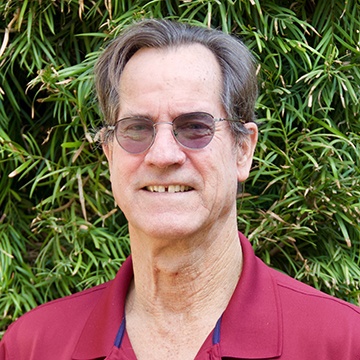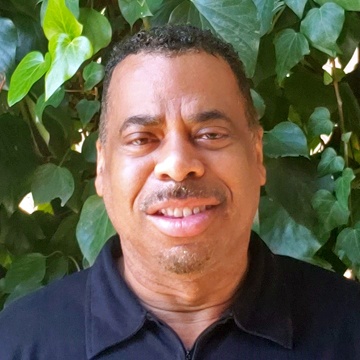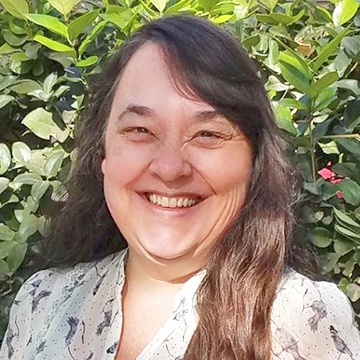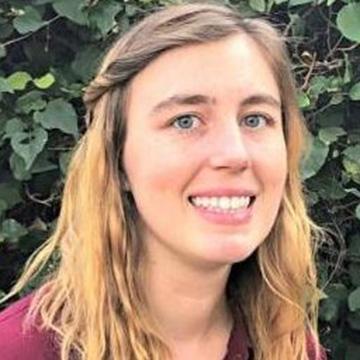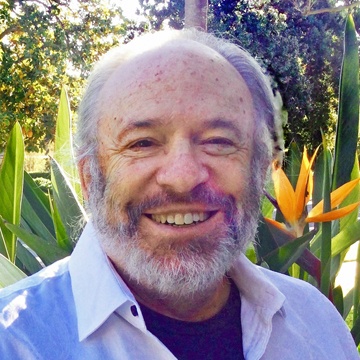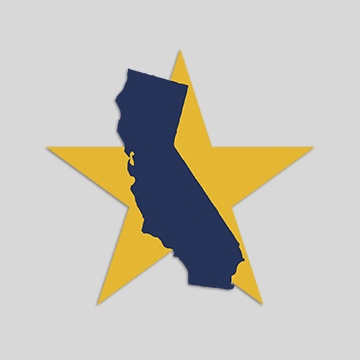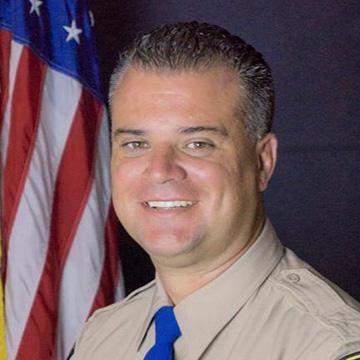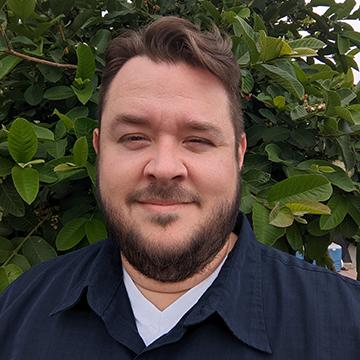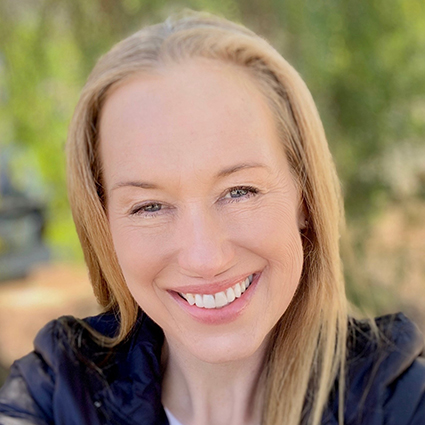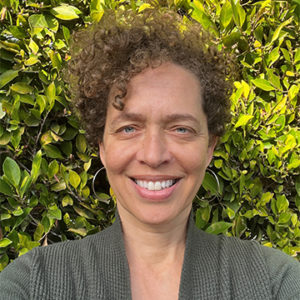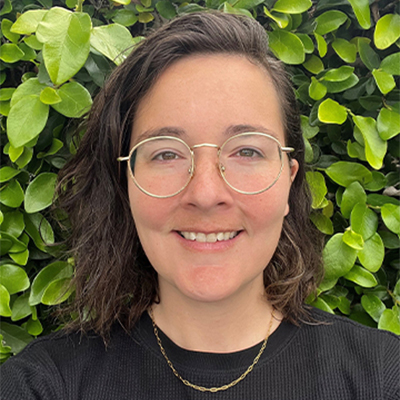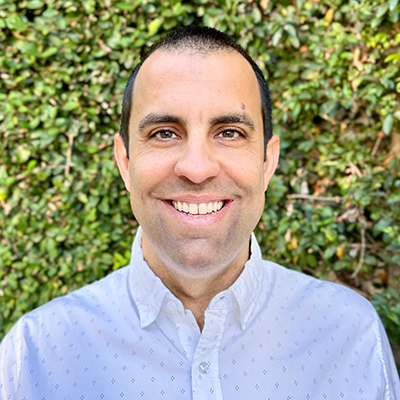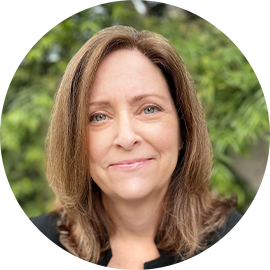Caltrans Highways & Freeways
These guidelines have been created to better serve the needs of productions applying for permits. Exceptions may be made on a case-by-case basis only, and unforeseen circumstances may necessitate changes to these procedures. Please know that everyone involved will always do their best to accommodate your production.
Check the CFC Production Alerts for conditions affecting filming on or over Caltrans property.
Caltrans Permit Contacts
California Film Commission (CFC) Caltrans Permit Coordinator
Alfonso Casey
Tel: 323.817.4104
Caltrans District 7 & Statewide Film Permit Coordinators
D7.Film.Permits@dot.ca.gov
Victor Ortega
Cell: 562.355.4466
California Highway Patrol
Statewide Film Media Relations
Officer Jonathon Dockweiler
Cell: 213.703.2070
Before You Apply: Step-by-Step Permit Application Information & Required Documents
When you have questions about a specific Caltrans location, start with a call to Caltrans Statewide Film Coordinators, not the local Caltrans district representative. Verbal consent from a District Engineer does not constitute automatic approval of a permit. There may be other factors involved.
Caltrans Permit Application Requirements
(Downloadable PDF here)
A complete application package with the following information and documents must be submitted:
- Provide specific details regarding the filming activity proposal
- Complete production tasks.
- Total number of vehicles and types that will be on the Caltrans right of way during filming or parked on Caltrans property.
- Total number of cast and crew members.
- Number of lanes that will be used during filming.
- Site/Vicinity Map for all film permit applications
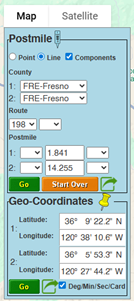
- Use the Caltrans Postmile Map: https://postmile.dot.ca.gov/PMQT/PostmileQueryTool.html
- Click on the ‘line’ button (circled in red) to enable the start/end points of your route.
- Click into the first numeric input box (where 1.841 is in the screenshot)
- Then click on your start point.
- Now click into the box underneath it (where 14.255 is in the screenshot) and…
- Click your end point.
- Use the print function in your browser (Ctrl/Cmd+P) and select ‘…Print to PDF’ as your printer to save as a PDF.
- Upload this PDF Postmile map to your application.
- If a lane, curb-lane, or full closure is part of the filming activity, then a Traffic Control Plan (TCP) is necessary. Your application is not complete without the TCP.
- Required to be stamped and sealed by a professional engineer (Civil or Traffic) with valid CA registration (Caltrans Encroachment Permit Manual Section 202.5)
- Plans are required to be flattened and in PDF, safeguarding the engineer’s seal and signature.
- Caltrans Standard Plans are acceptable, but Caltrans must approve.
- CA Licensed contractors (A or C31) can layout traffic controls on State roadways
- Caltrans EP Applicant – Contractor Authorization Form (DOT TR-0429) will be required.
- If filming will take place on an Interstate Highway (Any highway with a blue shield logo on a map) an extra Certificate of Insurance will be necessary.
- The Federal Highway Administration (FHWA) also requires the following to be named as certificate holder on a separate Certificate of Insurance.
- Certificate Holder:
State of California, Department of Transportation
100 South Main Street, Suite 100
Los Angeles, CA 90012
- Certificate Holder:
- With the Following Description of Operations:
- “The United States Department of Transportation, Federal Highway Administration (FHWA), and the State of California, Department of Transportation (Caltrans), are included as Additional Insureds for the permitted filming activities on Interstate Right-of-Way under Permit #*xxx-xxx-xxxx* / CFC #*xxxxx*.”
(Permit# and CFC# will be provided.)
- “The United States Department of Transportation, Federal Highway Administration (FHWA), and the State of California, Department of Transportation (Caltrans), are included as Additional Insureds for the permitted filming activities on Interstate Right-of-Way under Permit #*xxx-xxx-xxxx* / CFC #*xxxxx*.”
- The Federal Highway Administration (FHWA) also requires the following to be named as certificate holder on a separate Certificate of Insurance.
If you have any questions about the permit process or insurance requirements, call Alfonso Casey at the CFC at 323-817-4104.
Applying for a Caltrans Permit
Online Permit Application | Application Help
- Permit applications must be submitted to the CFC at least four business days (or 96 business hours) in advance of an activity. Requests for the use of UAS/drones and freeway/road closures must be submitted twelve (12) business days in advance. If, however, all required documents are submitted in a timely manner and Caltrans is satisfied with the description of proposed activities, the turnaround time could be shorter.
- Pay special attention to the times and dates being requested – especially if the time noted runs into the next day. For example, if you’re requesting May 11 from 8:00 p.m. to 2:00 a.m., you are actually requesting May 11 and May 12.
- Be aware that requests that are too broad may be denied. For example, the 12-hour activity window being requested may be rejected; whereas, the four-hour window of time actually needed for an activity may be accepted.
- When filling out applications, be as specific as possible. Include date(s), times, number of cast, crew and background players as well as activities. Do not give a range of dates. Caltrans cannot place “holds.” Indicate whether this is for a full closure, if you will require ITC (intermittent traffic control), rolling breaks, a CHP escort or if you will be filming with the flow of traffic. Indicate whether you will be doing car-to-car filming and if the camera car will have an arm attachment. Will you be bringing in a crane? Will you be shooting from a helicopter? Will pyrotechnics and/or stunt work be involved?
- Include details such as cross streets and mile markers. When requesting to film on freeway exits, specify the name of the off-ramp rather than the exit number.
- Understand that numerous revisions submitted late in the process may require a new permit and the start of another 4-day approval process.
- Note that the CFC does not issue retroactive permits.
- When emailing the CFC, always include permit number in the subject line.
An applicant may be instructed to apply for separate permits under the following conditions:
- A request includes the use of a freeway and a state highway (even if they’re in the same district).
- A request includes an activity on a state bridge that requires special considerations (more than merely driving with the flow of traffic).
- A request includes locations that require road or ramp closures.
- A request includes multiple locations, activities and dates.
Insurance
Insurance Requirements for Filming on State Property
The #1 reason permits are delayed or denied is incorrect or missing insurance documents. We recommend emailing these requirements to your insurance broker.
List of Brokers That Offer Both Long- and Short-Term Production Insurance
Monitor and Inspection Fees
There is no charge for the California Film Commission permit. However, Caltrans does charge a review fee, as well as an inspection fee for complex requests. Please note that Caltrans inspection fees are charged at time-and-a-half for weekend work and work done outside of normal business hours (8:00 a.m. – 5:00 p.m.) on weekdays.
Production companies are required to make arrangements for the assignment of CHP officers directly with the CHP State Film Liaison, Officer Jonathon Dockweiler at 213.703.2070.
The Use of UAS (Drones) Over Caltrans Property
Submissions for permits that include the use of UAS over Caltrans property will now be reviewed on a case-by-case basis.
Guidelines for the Use of UAS over Caltrans Property
UAS operators must adhere to all current and future FAA mandated rules with regard to distances from airports, military installations and any person(s) or property.
It is the responsibility of the permittee to obtain all necessary jurisdictional approvals and to submit a detailed description of planned flight operations (including diagrams, charts, and maps as applicable) and proof of required insurance coverage within a timely manner.
Filming Around the Exterior of Caltrans District 7 Headquarters
Requests to film outside of District 7 Headquarters at 100 S. Main Street in downtown Los Angeles should be directed to Caltrans Statewide Film Coordinators, who will work with Caltrans Facilities staff to review all requests. A walk-through with Caltrans personnel will be required to determine the impact of the proposed production activities. As Caltrans’ right-of-way extends to portions of the sidewalk surrounding the perimeter of the building, a Caltrans permit may be required (as well as a city permit through FilmLA). Depending on the impact to the building/plaza/driveways, review and monitor fees may also be required.
Revisions
Minor revisions must be submitted online. They are often accepted and will be considered on a case-by-case basis.
A new permit application, and possibly the beginning of a new 4-day approval process, may be requested if:
- The original application has been approved and a permit has already been issued.
- There is a change of location and/or Caltrans district.
- There are too many major changes.
- Days are added that do not occur within the same week as the original permit.
- The change entails a closure (which requires a 12-day approval process).
Keep in mind that revisions involving additional locations may necessitate:
- Additional CHP officers. If you have any questions about CHP involvement in your production, feel free to contact Officer Ian Ramer.
- A Caltrans inspector as well as added fees.
Denials
Permits/revisions may be denied:
- If applications and/or changes are submitted too late and too close to the shoot date (especially those requiring freeway closures).
- If there are extenuating circumstances (ongoing construction, public events, weather conditions, etc.).
- If there are safety concerns about your proposed activities.
- Due to other agency considerations (such as LAX and the Port).
- By the area engineer.
- If your certificate of insurance is not complete.
- If fees have not been paid.
Filming on Interstate Highways
Filming on Interstate Highways (Highways with a blue shield behind the highway number) requires approval from the Federal Highway Administration (FHWA). The FHWA requires at least 30 days to process a permit application.
In addition to the CFC insurance requirements, the FHWA also requires the following to be named as certificate holder on a separate Certificate of Insurance.
Certificate Holder:
State of California, Department of Transportation
100 South Main Street, Suite 100
Los Angeles, CA 90012
With the Following Description of Operations:
“The United States Department of Transportation, Federal Highway Administration (FHWA), and the State of California, Department of Transportation (Caltrans), are included as Additional Insureds for the permitted filming activities on Interstate Right-of-Way under Permit #*xxx-xxx-xxxx* / CFC #*xxxxx*.”
(Permit# and CFC# will be provided.)
Freeway and Road Closures
There is a 12 business day approval process for freeway closures, but if you know more than 12 business days in advance that you will be asking for a closure, submit your permit application as soon as possible. At least one meeting with Caltrans, CHP, Fire and CFC personnel may be needed to discuss logistics. (See below for more information on freeway closure meetings.)
Note that Caltrans will only close freeways on weekends – never during the workweek. And they will not close a freeway two weekends in a row. This practice is meant to minimize the inconvenience to motorists and area residents and to insure that certain freeways are not overused for filming – thus remaining available to productions in the future.
Freeways will not be closed for rehearsals. Exceptions are rare.
You will be given a Freeway Closure Etiquette sheet to attach to your call sheets for the day(s) you will be filming on the freeway.
Freeway Closure Meetings
If you are planning a freeway closure, contact the CFC (after submitting your application) about setting up a meeting. Participating in the meeting will be members of the CFC, Caltrans and CHP as well as the Deputy State Fire Marshal (as needed). Also joining the meeting should be:
- All relevant members of the production team (location manager, UPM, line producer, 1st AD, transportation coordinator, stunt coordinator)
- A representative from your permit company, if applicable
- A representative from your barricade company
- A representative from any relevant agency (LAX, Metro, etc.)
A representative from the affected city will be notified and invited to the meeting, but you should also notify the city where your proposed filming activities will occur.
During the meeting, you will be informed of approximately how many CHP officers will be required and if CMS (changeable message signs) will be needed.
Once Your Permit Has Been Issued
- Keep a printed copy of your permit with you on location at all times.
- Be advised that on the day of your shoot – if it is foggy, if it rains or has stopped raining but the surface of the freeway/road is still wet, your shoot will be canceled.
- Set lighting (such as Bebee lights) can never face ongoing traffic.
- Production vehicles driving onto closed sections of freeway should have placards on the windshield identifying the show/production, so CHP officers will know they’re authorized to drive into restricted areas.
- An 11-foot fire/emergency lane must remain accessible on closed freeways. If production or picture vehicles are parked on the shoulder, the keys must remain in the vehicles, so they may quickly be moved if necessary.
- Closed freeways may never be used as base camps. Only essential production vehicles (portable restrooms and necessary equipment trucks) will be allowed on the freeway.
By following the guidelines set forth above, the permit process runs smoother for all of us. And as you can see, just as it is in production, these procedures are subject to many variables. Be assured, however, that we will always do our best to accommodate your request for permits. Click here for a PDF summary of the guidelines.
Thank you for your cooperation.
California Film Commission
7080 Hollywood Blvd., Suite 900
Los Angeles, CA 90028
Tel: 323.860.2960 | 800.858.4749
Email the CFC | About Us
Stay Informed! Sign Up:
Newsletters
Production Alerts
Soundstage Alerts
CFC Board Notices Sign-Up
Careers
Download the Cinemascout app!





